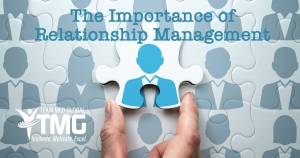 Relationship management is a key to personal effectiveness in TMG’s Executive MSP Competency Model. Effective relationship management is crucial, not only for personal job satisfaction, but also for the smooth functioning of medical staff services.
Relationship management is a key to personal effectiveness in TMG’s Executive MSP Competency Model. Effective relationship management is crucial, not only for personal job satisfaction, but also for the smooth functioning of medical staff services.
Understanding the Importance of Relationship Management
Relationship management in the workplace involves building and maintaining positive connections with colleagues, superiors, and subordinates. For MSPs, this means interacting with a wide range of professionals, from healthcare providers to administrative staff to regulatory bodies. The quality of these interactions can significantly impact the efficiency of processes like credentialing, provider enrollment, and compliance with healthcare regulations.
Key Strategies for Effective Relationship Management
Foster Open Communication: Clear and open communication is the foundation of any strong relationship. Encourage a culture where team members feel comfortable sharing ideas, concerns, and feedback. This can be facilitated through regular meetings, open-door policies, and the use of collaborative tools.
Practice Active Listening: Active listening involves fully concentrating on what is being said rather than just passively hearing the message. By showing empathy and understanding, you can build trust and respect, which are essential for healthy workplace relationships.
Develop Emotional Intelligence: Emotional intelligence is the ability to understand and manage your own emotions, as well as recognize and influence the emotions of others. MSPs with high emotional intelligence can better navigate the complexities of workplace relationships, leading to more harmonious and productive interactions.
Cultivate a Team-Oriented Mindset: Emphasize the importance of teamwork. Recognize and celebrate collective achievements. Encourage collaboration and support among team members to foster a sense of unity and shared purpose.
Resolve Conflicts Constructively: Conflicts are inevitable in any workplace. Approach conflicts as opportunities for growth and learning. Address issues promptly and fairly, focusing on finding solutions rather than assigning blame.
Show Appreciation and Recognition: Regularly acknowledge the hard work and contributions of your colleagues. This can be as simple as a thank-you note or as formal as a recognition program. Feeling valued increases job satisfaction and strengthens team bonds.
Invest in Professional Development: Encouraging and providing opportunities for professional development not only benefits the individual but also enhances the skills and knowledge within the team. This can lead to improved performance and a more dynamic and engaging work environment.
Balance Professionalism with Personal Connection: While maintaining professionalism is key, showing a genuine interest in the well-being and interests of colleagues can strengthen relationships. Simple gestures like remembering birthdays or inquiring about a colleague’s weekend can make a significant difference.
Effective relationship management is a vital skill for MSPs. By implementing these strategies, you can create a more positive, collaborative, and productive workplace. Remember, strong relationships don’t just lead to a better work environment; they also contribute to the overall success and efficiency of medical staff services.

